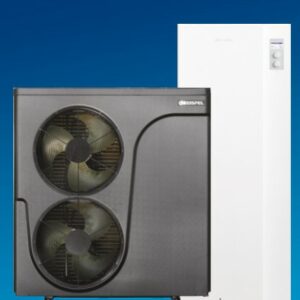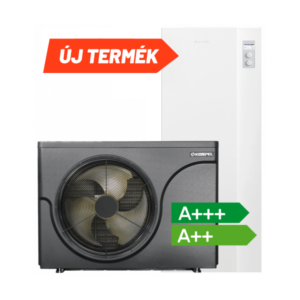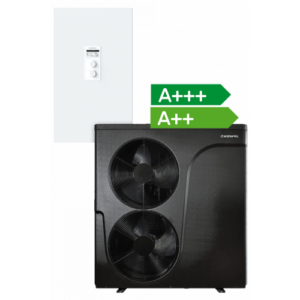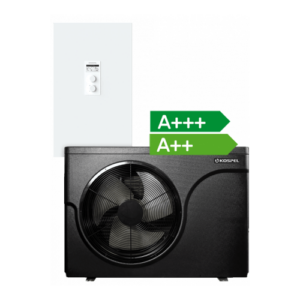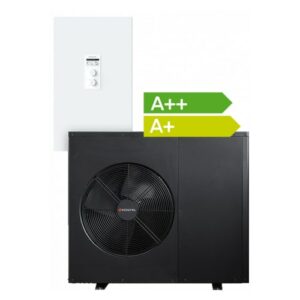How does it work? Which heat pump to choose?
Heat pumps are an efficient and environmentally friendly way of transferring heat energy from one place to another, so they can be used for cooling or heating. To make the best decision in choosing the best heat pump for your needs, it is important to consider a few important aspects:
Heat requirement and size
Firstly, determine how much space you need to cool or heat. We need to choose the right heat output for the size of our home or building to ensure efficient operation.
Type of heat pumps
There are several types of heat pumps available, each with its own advantages and disadvantages:
- Air to air heat pump: It absorbs the heat from the outside air and transfers it to the inside air. It is characterized by simple installation and a favorable price, but its efficiency decreases in extreme cold weather.
- Air to water heat pump: It extracts heat from the outdoor air and transfers it to water, so it can be used for heating or hot water production. Works great in mild climates.
- Water to water heat pump: It uses underground or underwater spring heat and pipes the heated water directly into another water source, such as a well or lake. It is effective, but requires a more complicated installation and requires groundwater or a lake.
- Soil to water heat pump: It extracts heat from the soil and uses it for heating or cooling. It provides stable efficiency and is less dependent on external weather conditions.

For heating
The basic function of the heat pump is the design when we use the energy produced by the heat pump to heat our home
Our air-water type heat pumps in combination with a radiator or floor heating, ceiling or wall heating provide an optimal solution for the ideal temperature of your home all year round. All this so that nearly 75% of the energy needed for heating is obtained from the air, so you can heat your house sustainably and economically.
For domestic hot water (DHW)
Increase your energy efficiency and entrust the production of hot water to a heat pump! Compared to a traditional electric water heater, it can significantly reduce the electrical energy consumption required to produce hot water by up to 60-70%.
Depending on the type, the indoor unit of the heat pump can even be suitable for storing heated water for bathing, washing hands, and washing dishes. Indoor units of this type are not only practical and space-saving, but also aesthetic, thus expanding the variations in the placement of the equipment. If a larger storage capacity is needed, it is also possible to use a storage unit outside the indoor unit, which provides an ideal solution for larger families as well.
For cooling
The heat pump should not only be seen as a heating solution, cooling can also be achieved with a properly selected heat emitter (for example, ceiling cooling/heating, or fan coil). Thus, with a central device, we can ensure the comfort of our home in winter and summer without unnecessary piping, additional indoor units and other compromises affecting the interior design.
Energy efficiency
It is worth choosing a heat pump that is energy-saving and environmentally friendly. Energy efficiency is usually measured with a COP (Coefficient of Performance): the higher the COP value, the more efficient the heat pump.
Redesigned enclosure
The black high-quality cover hides the large fan, which also lowers noise emissions and improves air flow.
R32 refrigerant
The R-32 refrigerant with a lower global warming potential (GWP) ensures higher energy efficiency and lower CO2 emissions.
Operation up to -25°C outdoor temperature
It provides a flow water temperature of 60°C at a temperature of -7°C
Smart control
Control your heat pump from anywhere and at any time using intelligent technology!
Brand and reliability
Choose a reliable brand of heat pump from a company that has a good reputation in the market and provides excellent customer service. The best choice for you is the Kospel product range!
Place of installation
Let’s also think about the installation location of the heat pump. The outdoor unit must be located in a properly selected location and preferably in an area where it disturbs others with minimal noise and vibration.
Costs and supports
Consider the purchase and installation costs of the heat pump, as well as pay attention to possible subsidies or discounts that are provided at the government or local level for energy-saving investments.
Choosing a heat pump is not always an easy task, and it is important to keep individual needs and circumstances in mind. However, with a thoughtful decision, we can achieve long-term savings in our energy costs, while ensuring the comfort of our home in an environmentally friendly way. It is always worth asking for the help of experts in order to achieve the best result.

